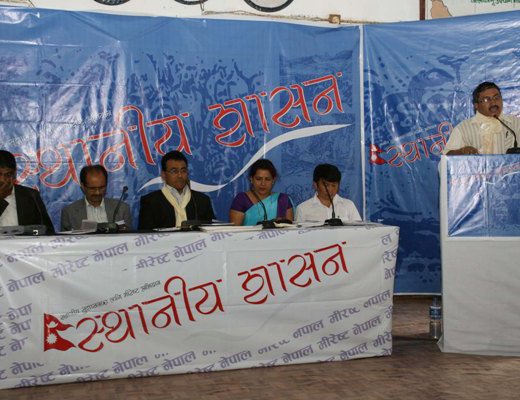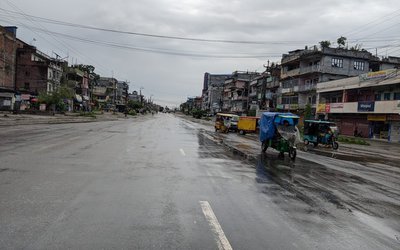
For almost over a decade, residents of Ratanchura Village Development Committee of Sindhuli District, 200 kilometers east of capital Kathmandu, did not know how their Village Development Committee functioned and how it spent its annual budgets.
Not only the residents of Ratanchura, but also the people all over the country faced a similar knowledge gap. After the dissolution of the local bodies in 2002, several unaccountable mechanisms were put in place to run them. The bodies are now under a secretary, who runs them single handedly.
The Local Governance Act 1998 has put a lot of check and balance to make the local bodies accountable to the people. However, after the expiry of the tenure of the elected representatives of the local bodies in 2002, the misuse of resources and irregularities has continued for want of an accountable system.
At a time when Nepal's development partners, political leaders and civil society organizations are expressing their concern over how to make the local bodies accountable, MIREST-Nepal's ongoing multiple interventions program has shown a way as to how the local bodies can be made accountable through the social forum of various groups. MIREST-Nepal is applying an independent third party mechanism, social networking and public hearing tool, to make the local bodies accountable.
Supported by Norwegian government, the program has made a lot of progress in making the local bodies, and others with powers devolved in them such as the livestock, education and health offices, accountable to the people. MIREST-Nepal has been continuing with the program for the last three years. Along with making the planning process and budget allocation more friendly to children, youth and indigenous communities, the program also increases the awareness about the functioning of the local bodies.
In the absence of elected representatives, there has been a serious problem of accountability at the local level. Although the local bodies are given important roles, such as making recommendations for obtaining the citizenship certificate, birth certificate, death certificate, certification for migration and so on, out of 3915 Village Development Committees, the posts of 800 secretaries are vacant.
"We are experimenting with the program in seven districts. There is the need to improve the capacity of local officials, build their capacity and raise awareness. At a time when there is a lack of an accountable system at the grass-root level, MIREST-Nepal, through its multi-media program, is focusing on providing social forum," said Suresh Acharya, president of MIREST-Nepal.
It has had major impacts on the planning process, budget allocation, and target group. Our program increases the awareness level of the local people during the planning process. It also raises the awareness among children, youth, women and disadvantaged and ethnic groups. In some of the districts, VDCs and DDCs have started to allocate separate budgets for children and youth.
"We will support all the programs which are helping to make the local bodies accountable," said Dinesh Thapaliya, spokesperson of the Ministry of Federal Affairs and Local Development. "MIREST-Nepal has been implementing the program that has been supporting the local bodies."
As there is increasing awareness among the youth, children and indigenous communities, everyone is now seeking their share in the decisions. Through the independent third-party mechanism, MIREST has been monitoring the information management system and investigation through mobilization of the media practitioners to manage information. This helps to identify the gaps to make the projects successful.
Through its public hearing programs, MIREST-Nepal is bringing policymakers, policy implementers, service providers and service receivers together. The program helps to minimize the gap that has existed in the service delivery and service coordination in several places. After the implementation of the program, a large number of women are activated. Women's level of awareness has also gone up.
"We mobilize the youth at all the levels of local bodies. We are also working to create the local bodies friendly to persons with physical disability. We have conducted several programs, including 220 for leadership level, and 215 RTI and 1055 participated in interactions. More than 12000 people are involved in local governance discourse," said Acharya.
Along with carrying out administrative and legal functions, the local bodies have also given a whole lot of responsibility for development planning at the local level. As there is a virtual mess of all the actions, MIREST Nepal has been making the local bodies transparent through its Social Accountability program.
MIREST has been working now in Sankhuwasabha, Sunsari, Sindhuli, Mustang, Dang, Humla and Kachanpur. The programs are running in seven district headquarters, 3 municipalities and 21 VDCs, according to MIREST-Nepal.
The program includes public hearing, interactive television shows in rural areas, and use of RTI tool in rural areas to make the local bodies accountable. Over 400 people and local leaders were trained for RTI.
By doing all this, MIREST-Nepal has shown that there is a way to make the local bodies accountable by using various media.
- MELAMCHI WATER SUPPLY: No Interruption During Monsoon
- Jun 25, 2025
- KOREAN RETURNEES: Successful Integration
- Jun 25, 2025
- UPPER TRISHULI-1: Engaging With Local
- Jun 25, 2025
- IME GROUP: Twenty Five Years Of Journey
- Jun 24, 2025
- NEPAL’S AIR POLLUTION: A Growing Health Concern
- Jun 24, 2025















